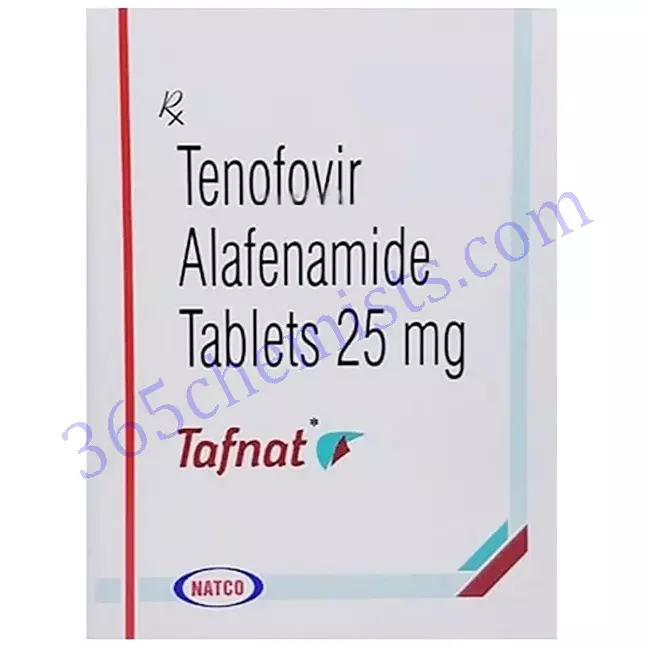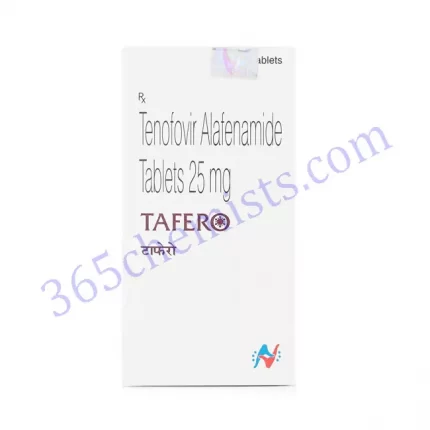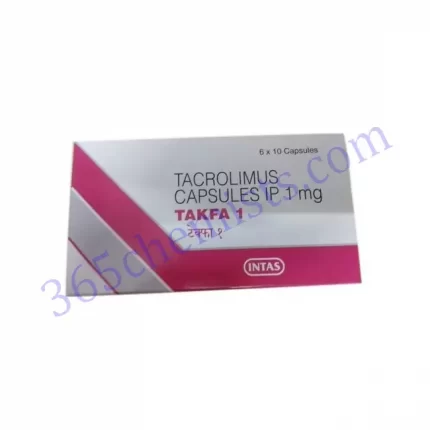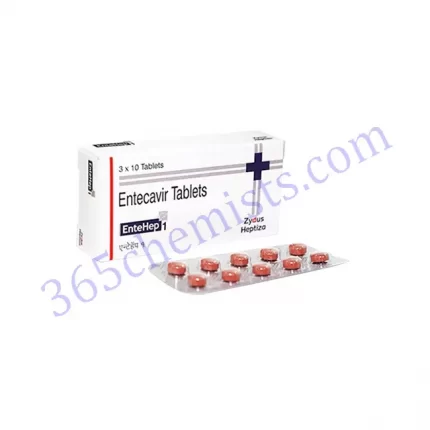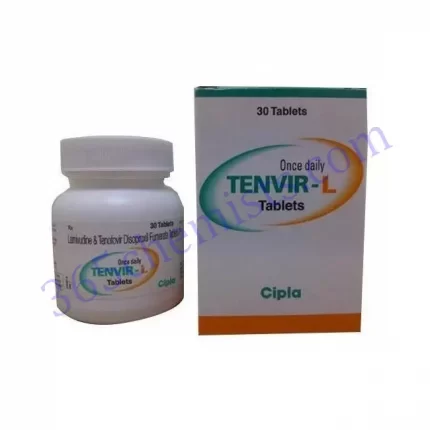Tafnat 25mg Tablet (Tenofovir Alafenamide 25mg):
The human immunodeficiency virus (HIV) is treated with a medication called Tafnat 25mg Tablet, which contains Tenofovir Alafenamide 25mg. This medication is one of the most commonly prescribed medications for this purpose. It is an antiretroviral drug, which means that it is designed to prevent the virus from replicating itself, which in turn has the effect of lessening the strain that the virus places on the immune system. The purpose of this article is to provide a comprehensive overview of Tafnat 25mg Tablet, including information on its applications, mode of action, dosage, potential adverse effects, and safety considerations.
Uses
The primary application for the Tafnat 25mg Tablet is the management of HIV-1 infection in adults and adolescents older than 12 years of age. It is an essential component of antiretroviral therapy (ART) regimens, where it collaborates with other antiretroviral medications to achieve viral suppression and improve immune function. This is one of the most important uses for this medication. The Tafnat 25mg Tablet works to prevent the replication of the virus by inhibiting the enzyme responsible for reverse transcriptase. This results in a lower viral load and a slower progression of the disease. The treatment of HIV infection and the prevention of acquired immunodeficiency syndrome (AIDS) both make extensive use of this medication.
Mechanism of Action
Tenofovir alafenamide, the active ingredient in Tafnat 25mg Tablet, functions as a prodrug, meaning that it is converted into its active form, tenofovir diphosphate, inside the cells of the human body. The HIV enzyme reverse transcriptase, which is essential for the reproduction of the virus, can be selectively inhibited by the drug tenofovir diphosphate. By inhibiting the activity of this enzyme, the Tafnat 25mg Tablet is able to prevent the transformation of viral RNA into DNA, which effectively stops the cycle of viral replication. Because of this inhibition, the viral load in the body is decreased, which enables the immune system to recover and perform its duties in a more effective manner. Because it possesses both a high level of potency and a high genetic barrier, the Tafnat 25mg Tablet is effective against HIV strains even if those strains have become resistant to other antiretroviral drugs.
Dosage and Administration
A healthcare professional should determine the appropriate dosage of Tafnat 25mg Tablet for each individual patient, taking into account relevant factors such as the patient’s age, weight, renal function, and individual response. Tablets of Tafnat 25 mg can be taken orally and are intended to be consumed once daily, regardless of whether they are taken with or without food. The pill ought to be taken in its entirety, without being chewed or crushed in any way. It is absolutely necessary to take the medication exactly as directed and to strictly adhere to the treatment plan that was suggested. If you skip doses or stop taking the medication without first consulting your doctor, this could lead to a return of the virus as well as the development of resistance to the drug.
Side Effects
Tafnat 25mg Tablet, like any other medication, has the potential to cause certain adverse effects; however, not everyone will experience them. Headaches, nausea, diarrhoea, and fatigue are some of the common side effects that may occur. Mild abnormalities in liver function tests may also occur. These adverse effects are typically mild and fleeting, meaning that they go away on their own over the course of time and do not call for any special treatment. However, it is imperative that a medical professional be contacted in the event that any of these potential adverse effects continue or become more severe. In extremely unusual circumstances, the use of Tafnat 25mg Tablet may result in more serious adverse effects. These adverse effects may include kidney issues, lactic acidosis, or liver toxicity. During treatment, it is recommended to perform routine monitoring of renal function as well as liver enzymes.
Precautions
It is imperative that any pre-existing medical conditions, allergies, or medications that are currently being taken be disclosed to the healthcare professional who is prescribing the Tafnat 25mg Tablet prior to beginning treatment with the medication. There is a possibility that Tenofovir Alafenamide will interact negatively with other medications, which could result in unwanted side effects or diminished therapeutic value. During treatment with Tafnat 25 mg Tablet, patients who have a history of kidney or liver disease need to have their condition carefully monitored. It is essential to abstain from drinking alcohol and avoid engaging in other high-risk behaviours that could potentially transmit HIV to other people. It is recommended that people who are taking Tafnat 25mg Tablet have their renal function, bone density, and HIV viral load monitored on a regular basis.
Conclusion
The antiretroviral treatment of HIV infection includes the use of the Tafnat 25mg Tablet, which contains Tenofovir Alafenamide 25mg. This medication is an essential part of the treatment. It does this by inhibiting the replication of the virus, which helps reduce the viral load, improve immune function, and slow the progression of the disease. When trying to achieve the best possible results, it is absolutely necessary to take the medication exactly as directed and to stick to the treatment plan that was suggested. When incorporated into an all-encompassing HIV management strategy, the Tafnat 25mg Tablet has the potential to significantly improve the quality of life of people living with HIV while also contributing to the fight against the further spread of the virus on a global scale. The utilisation of Tafnat 25mg Tablet in a manner that is both safe and effective requires consistent monitoring as well as open lines of communication with medical professionals.

